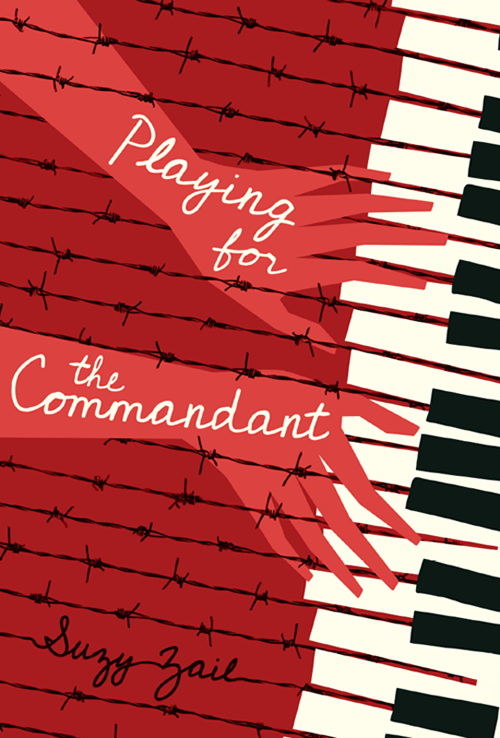
Playing for the Commandant
فرمت کتاب
ebook
تاریخ انتشار
2014
Lexile Score
700
Reading Level
3
ATOS
4.9
Interest Level
9-12(UG)
نویسنده
Suzy Zailناشر
Candlewick Pressشابک
9780763666736
کتاب های مرتبط
- اطلاعات
- نقد و بررسی
- دیدگاه کاربران
نقد و بررسی

September 1, 2014
The world of 15-year-old Hanna Mendel—a Jewish Hungarian concert pianist in training who longs to follow in the footsteps of her idol, Clara Schumann—turns menacing when Hungary falls to Germany in 1944. New laws require Jews there to wear yellow stars on their clothes and live in ghettos, and, before long, she, along with many others, is sent to the Auschwitz-Birkenau concentration camp. Zail, whose memoir The Tattooed Flower recounted how her father survived the Holocaust, poignantly conveys Hanna’s mounting losses—at first, her home, piano, suitcase, and clothes; then, when men are separated from women in the camp, her father; and even her hair and her name. Strengthened by Erika, her spirited sister, Hanna holds onto her one remaining possession: a black C-sharp piano key, and the hope it represents. Although she witnesses much cruelty and degradation, Hanna also discovers courage, integrity, and ingenuity in surprising ways; in particular, through Karl, the quiet, musical son of the cruel commandant for whom Hanna plays piano, who calls her “by my name, not my number.” An elegant, disturbing portrait of one of history’s bleakest moments, offset by the subversive power of love. Ages 12–up.

October 1, 2014
Gr 8 Up-It's 1944, and 15-year-old pianist Hanna and her family have been taken from their Hungarian Jewish ghetto to Auschwitz-Birkenau. Having lied about her age, Hanna is selected to play piano for the camp leader, or commandant, a job she hopes will help her save her mother and sister. Captain Jager's casual cruelty contrasts with his son Karl's sensitive compassion, and soon Hanna and Karl develop a secret attraction. The teen feels like a traitor for liking Karl, her fellow prisoners despise her for cooperating with the commandant, and Russian liberators are approaching-and with them, truths that Hanna has refused to acknowledge. An oddly adult voice (Hanna says that playing a duet is "like taking a lover") gives way to more typical teenage reactions as the story progresses, but questionable historical accuracies persist: while the protagonist technically could have had a bat mitzvah, studied algebra, and casually carried a thermos, these seem unlikely. Musical details add interest, but light teen romance seems out of place in a Holocaust narrative, and overall the simplistic writing style tells rather than shows ("I learned that to care was weak and brutality a virtue in this upside-down world"). Zail's father survived the Holocaust and her desire to honor him is noble, but recent titles such as Rose Under Fire by Elizabeth Wein (Hyperion, 2013) and Prisoner of Night and Fog by Anne Blankman (HarperCollins, 2014) offer more nuanced, sophisticated treatments. An additional purchase for collections seeking exhaustive Holocaust coverage.-Jill Ratzan, I. L. Peretz Community Jewish School, Somerset, NJ
Copyright 2014 School Library Journal, LLC Used with permission.

September 1, 2014
A Jewish girl sent to Auschwitz-Birkenau lives because of the whims of a sadistic camp commandant. Even in the squalor of the 1944 Hungarian ghetto, Hanna Mendel has hope for her promised place at the Budapest Conservatorium of Music, until the Nazis order the ghetto's Jews onto cattle cars. As her journey progresses, Hanna systematically loses everything: her home and piano, cleanliness, preciously hoarded sheet music, her father at the gates of Auschwitz-Birkenau, and her clothes and hair-even her name-as she's processed into the camp. Chance leads Hanna to a terrible hope, for the camp's commandant seeks a pianist. Like all the commandant's personal slaves, her life is only minimally improved. Though she doesn't work at hard labor, she starves just as harshly as any prisoner. The commandant's sulky son, who helps sneak tiny scraps of food into the camp, appeals to Hanna much more than the diseased, wretched Jewish boys. Except for the infelicitously handled romance, Hanna's story is reminiscent of such classics as Aranka Siegal's Upon the Head of the Goat (1981). If anything, Hanna's tale isn't brutal enough-her starvation has few physical implications, for instance, and she's blithely ignorant until war's end of what's burned in the camp ovens or the fate of Dr. Mengele's twins. With fewer living Holocaust survivors each year, it's increasingly important to tell their story, and this is one, however soft-pedaled. (Historical fiction. 11-15)
COPYRIGHT(2014) Kirkus Reviews, ALL RIGHTS RESERVED.

November 1, 2014
Grades 8-11 Hanna, 15, is a talented pianist living in Hungary in 1944, until the SS storms the ghetto and takes her and her family to Birkenau. The camp is a horror, but Hanna and her sister manage to survive. When word gets out that Hanna is a gifted musician, she is selected to play piano daily in the commandant's drawing room. She struggles with deep feelings of guilt, not only because she receives special treatment but also because she is entertaining the sadistic man responsible for the atrocities she sees every day. But music and a burgeoning forbidden romance with the commandant's son are the only things that make her feel human, and they end up being the keys to her survival. Zail's story is as gut-wrenching as any Holocaust tale, particularly when, upon their liberation by Russian troops, Hanna discovers that her own dehumanizing experiences in the labor camp were nothing compared to the barbarity that occurred in the extermination camps. The haunting, matter-of-fact tone of Hanna's story will likely resonate with teens learning about the Holocaust.(Reprinted with permission of Booklist, copyright 2014, American Library Association.)

























دیدگاه کاربران